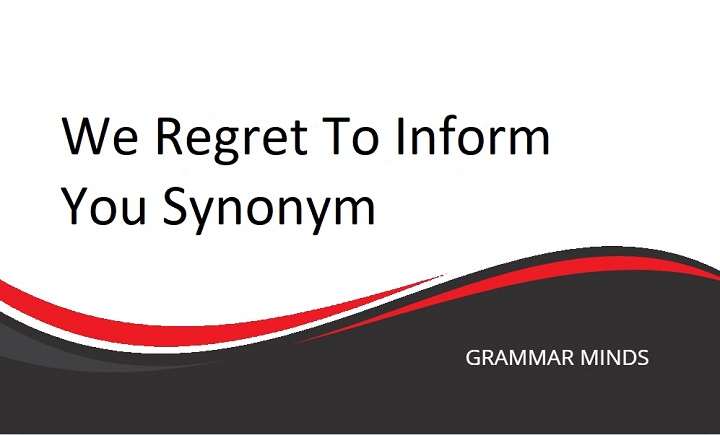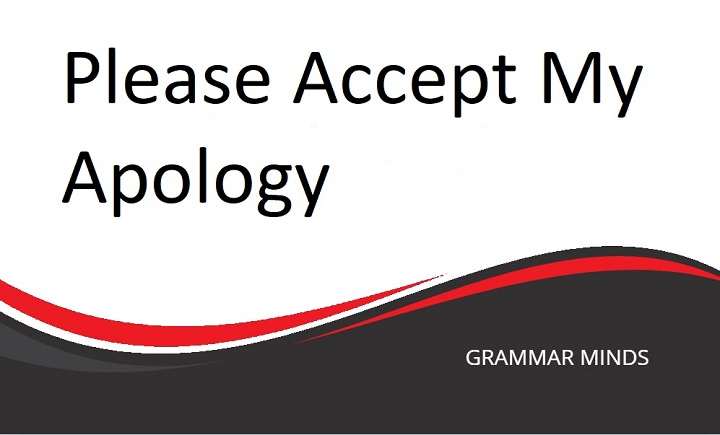Do you often find yourself using the phrase “we regret to inform you” in professional or personal communication? Have you grown tired of this repetitive expression, especially when trying to convey difficult news? If so, you’re not alone. While “we regret to inform you” is a widely used phrase, especially in formal settings, its overuse can sometimes make communication feel monotonous or impersonal.
The good news is that there are several alternative phrases that you can use to communicate the same sentiment more dynamically, depending on the context of the message. Whether you’re writing an email, delivering a formal notice, or communicating verbally, having different ways to express regret will help you sound more thoughtful and nuanced in your communication. In this article, we’ve compiled a handy list of alternative phrases that you can use to mix things up and sound more varied.
Other Ways to Say “We Regret to Inform You”
It is with deep regret that we must inform you
Unfortunately, we have to let you know
We are sorry to inform you
We must unfortunately report
Regrettably, we must advise you
With great regret, we announce
Sadly, we must inform you
Please accept our apologies as we inform you
We are disappointed to notify you
We sincerely regret to let you know
Each of these phrases conveys the same sentiment as “we regret to inform you” but with subtle differences in tone and formality, making them suitable for various contexts. Let’s take a closer look at how to use them effectively.
Key Notes
“We regret to inform you” is a grammatically correct and formal expression often used in professional communication. It conveys a sense of seriousness and empathy when delivering bad news. However, using this phrase too frequently can make it feel overly formal or distant. Below, we’ll explore the usage of some of the alternative phrases, along with practical examples of how you can apply them in both formal and informal settings.
- “It is with deep regret that we must inform you” is suitable for highly formal situations, such as official company notices or sensitive announcements.
- “Unfortunately, we have to let you know” is more versatile, offering a balance between formal and conversational tone, and can be used in emails or face-to-face discussions.
- “We are sorry to inform you” provides a softer, more personal way of expressing regret, making it ideal for conversations where empathy is important.
Let’s explore each phrase in detail.
It is with Deep Regret that We Must Inform You
Usage:
If you’re looking for a formal and sincere way to say “we regret to inform you,” try using “It is with deep regret that we must inform you.” This alternative is ideal for official settings such as business emails, formal letters, or significant announcements where you need to convey both authority and empathy.
Example (in an email):
Dear Mr. Johnson,
Thank you for your application to our firm. After careful consideration, it is with deep regret that we must inform you that we have decided to move forward with another candidate at this time.
Best regards,
Jessica Carter
This phrase adds a touch of sophistication and solemnity, making it suitable for sensitive communications, especially when the news might have a significant impact.
Unfortunately, We Have to Let You Know
Usage:
“Unfortunately, we have to let you know” is a more casual yet respectful way of delivering bad news. It works well in conversations or emails where you don’t want to sound overly formal, but still need to convey a professional tone.
Example (in conversation):
Hi Sarah,
Thank you for your feedback on the project. Unfortunately, we have to let you know that we won’t be able to implement the suggested changes due to budget constraints.
Best,
James
This phrase is less rigid than “we regret to inform you” but still maintains professionalism, making it appropriate for business communications and day-to-day interactions.
We Are Sorry to Inform You
Usage:
This phrase provides a softer approach and can be used when you want to express more empathy or sorrow. It is especially useful in customer service settings or personal conversations where maintaining a compassionate tone is important.
Example (in customer service):
Dear valued customer,
We are sorry to inform you that your order has been delayed due to unforeseen shipping issues. We are working to resolve the matter as quickly as possible and will provide updates shortly.
Thank you for your understanding,
Customer Service Team
This alternative strikes a balance between formal and personal, making it suitable for apologetic customer communications.
We Must Unfortunately Report
Usage:
For a more formal tone, “We must unfortunately report” can be used in written notices, business updates, or when delivering official statements. It conveys seriousness and responsibility, often making it a good choice for press releases or corporate communications.
Example (in a press release):
It is with a heavy heart that we must unfortunately report a data breach affecting several of our customers’ personal information. We are taking swift action to address this and have engaged cybersecurity experts to assist in the investigation.
In this context, the phrase emphasizes formality while delivering serious news.
Regrettably, We Must Advise You
Usage:
“Regrettably, we must advise you” is another formal alternative that fits well in legal or professional communications. It implies that the sender is reluctantly delivering the bad news, adding a subtle layer of emotion to the message.
Example (in a legal notice):
Dear Mr. Adams,
Regrettably, we must advise you that your application for an extension has been denied due to insufficient documentation. Please feel free to resubmit your request with the required materials.
Sincerely,
Legal Team
This phrase is especially suitable when you need to deliver news in a serious, no-nonsense manner.
With Great Regret, We Announce
Usage:
This phrase is ideal for public announcements or when addressing large audiences. It conveys a sense of responsibility while maintaining a formal tone, making it appropriate for official statements or business reports.
Example (in a company memo):
Dear Staff,
With great regret, we announce the closure of our New York office effective next month. This decision was not made lightly, and we are working closely with affected employees to ensure a smooth transition.
Regards,
Management Team
The phrase adds weight to the announcement, making it clear that the decision was significant and made after careful consideration.
Is It Correct to Say “We Regret to Inform You”?
Yes! “We regret to inform you” is grammatically correct and suitable for both formal and informal settings. It’s a versatile phrase that can be used in professional emails, conversations with colleagues, or casual chats with friends. However, it is generally more appropriate for formal communication, particularly when the news being delivered is serious or negative.
That being said, using synonyms like the ones we’ve listed above will help you vary your language and sound more thoughtful in your communication.
Additional Variations
If you’re looking to switch things up even further, you can try some slight variations of “we regret to inform you,” like the following:
- We regret to announce
- We are saddened to inform you
- With regret, we bring you this news
These variations allow you to tweak the tone of your message depending on how formal or personal you wish to be.
Also Read
This is Noted: Other Terms and Alternatives for Professional and Personal Communication
In conclusion, “we regret to inform you” is a perfectly acceptable and grammatically correct phrase that works in various formal and informal contexts. However, by using the alternative phrases provided in this article, you can diversify your vocabulary and communicate more effectively in different settings. Whether you’re crafting an email, making an announcement, or delivering personal news, choosing the right phrase will help you convey empathy and professionalism, making your message feel more engaging and thoughtful.







